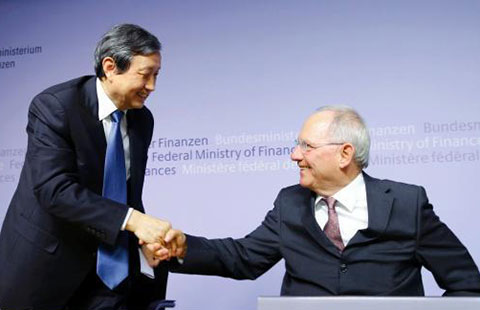Spain takes pains to lure more tourists from China
By EMMA GONZALEZ (China Daily) Updated: 2015-03-24 07:45
 |
|
This photo taken Jan 13, 2010 shows Antoni Gaudi's Sagrada Familia church, in Barcelona, Spain.[Photo/IC] |
It is not customary in Spain to have white rice for breakfast, but the grain is now on the menu of buffets at five-star hotels, as more Chinese tourists vacation in the Mediterranean country.
Adapting menus to cater to Chinese tastes and offering maps and signs in Chinese are just part of a broader strategy in Spain.
Although the number of Chinese tourists has been gradually rising in recent years, the country needs to make more changes to lure a greater number of visitors, said experts at the III Chinese Friendly Cities World Conference, which was held in Madrid last week.
More than 100 million Chinese traveled abroad in 2014, according to the China National Tourism Administration. But only 288,000 Chinese visited Spain in 2014, said that nation's official tourist board, Turespana.
The low number does not reflect a lack of tourist attractions. Spain is the world's third-most visited country, after France and the United States. Last year, the country welcomed about 65 million international tourists.
Arturo Ortiz, an official at Turespana, said: "The late realization of the need to use China's social networks to promote Spain's image, insufficient flights connecting the two countries and long visa application procedures are the main reasons why Spain has failed to attract more Chinese visitors."
Spain will streamline the visa application process so that it takes only 48 hours, and the Spanish government has reportedly held talks with Asian airlines to increase flights.
Carlos Marcuello, the director of the Master of Business with China at Funiber, the Iberoamerican university foundation, said: "Spain was late to catch the train of Chinese tourism, but we are still in time to get on. The private sector and official bodies have been working together to improve the services offered to Chinese visitors."
The number of travel agents and consulting firms specializing in increasing the flow of Chinese visitors have mushroomed in Spain in the past two years.
As China's middle class has become more sophisticated, so too have the packages they are offered-ecotourism, itineraries for women travelers, exclusive trips to Spain's top fashion houses and the like.
Experts said there is still room for more diversification in the market, with sports tourism and trips to rural areas experiencing increasing demand.
Chinese entrepreneurs are also no strangers to the potential of the Spanish market. Last year, leading developer Dalian Wanda Group Co Ltd bought Madrid's iconic building, Edificio Espana, to transform it into a luxury hotel and a shopping mall mainly directed at Chinese tourists.
Spain is not the only European country luring Chinese visitors, with Italy also taking the opportunity of the 2015 World Exhibition in Milan to make reforms.
Giancarlo Dall'Ara, a marketing professor at the Italian university CCT Assisi, noted: "Italy has reduced the visa application procedure to 36 hours. Additionally, it has increased the number of weekly direct flights to 50 to accommodate Chinese tourists attending the Milan Expo."
- Israel requests to join Asian Infrastructure Investment Bank
- Chinese stocks rebound on April 1
- China, the West in Africa: more room for cooperation than competition
- Nanjing cuts taxi franchise fees
- Air China increases flights to Milan, Paris
- JD.com raises delivery charges
- Veteran corporate strategist upbeat about China economy
- L'Oreal China sales revenue up 7.7% in 2014

















